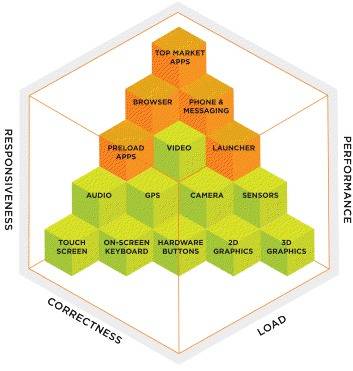When developers think of application testing, it always centers around how an app will perform on a particular device. This is especially important in the Android ecosystem that has upwards of 300 devices from a variety of original equipment manufacturers worldwide. From the inverse perspective, nobody ever thinks of the testing needs of the carriers and OEMs.

Cloud-based testing platform Apkudo thought about manufacturers and carriers with a new release of device analytics platform. Manufacturers can now test devices against the top Android apps before releasing. The idea is that if a device is tested from the supplier side, fewer handsets will be returned by consumers, potentially saving manufacturers billions of dollars.
Apkudo tests with what it calls a “device cloud.” The configuration of more than 300 Android devices are set up in the cloud and mobile app developers can run their projects through that cloud to make sure it will work across OEMs and Android system versions.

For Apkudo’s device analytics, the opposite approach is taken. Manufacturers and network operators can test their apps against the contents of the Android Market. Apkudo will run a device against the top 200 apps in the Market to test functionality with the touchscreen, keyboard, audio, device access (accelerometer and GPS, for instance) along with performance characteristics.
This should provide developers, network operators and manufacturers with tools against Android fragmentation. As we noted last week, there is actually less fragmentation of Android devices than many think, with the optimal Android handset running on a 4.3-inch screen on version 2.3 Gingerbread. Yet, with the sheer volume of devices and applications available in the Android ecosystem, testing is still one giant headache.
Apkudo can speed up on the process that OEMs must go through to test devices. According to CEO Josh Matthews the process normally takes 6-8 weeks. Apkudo says it can do it in three days.
Device analytics will break down the results into two categories: characterization and optimization benefits. Characterization benefits help operators target competing devices while expanding their own portfolios. Imagine it as a bench mark against the rest of the ecosystem. Optimization benefits recommends how devices can be made better before release to be truly competitive in the market place.

The first U.S. carrier to sign on with Apkudo is MetroPCS. Apkudo also has agreements with “most major OEMs” in the Android ecosystem.
App developers should be happy with Apkudo’s testing abilities because it means that the OEMs could have a more efficient testing program to make sure apps work on their devices. When it comes to app functionality on Android, developers need to work the manufacturers and carriers to ensure a quality experience. The end of fragmentation, after all, is a two way street.






